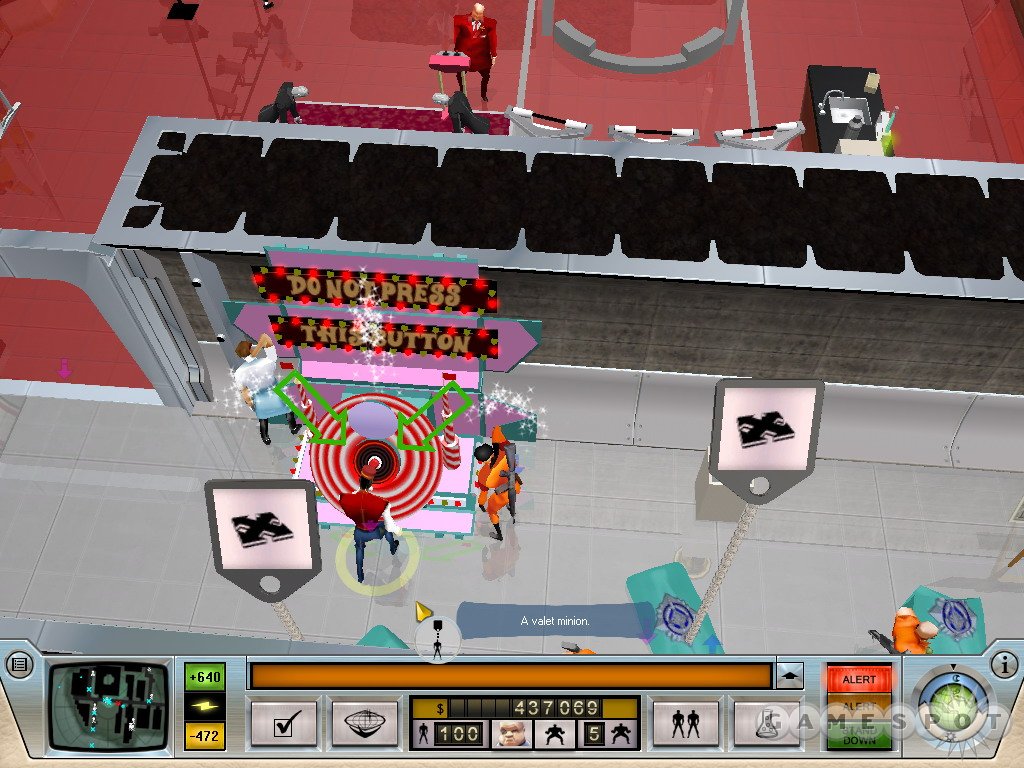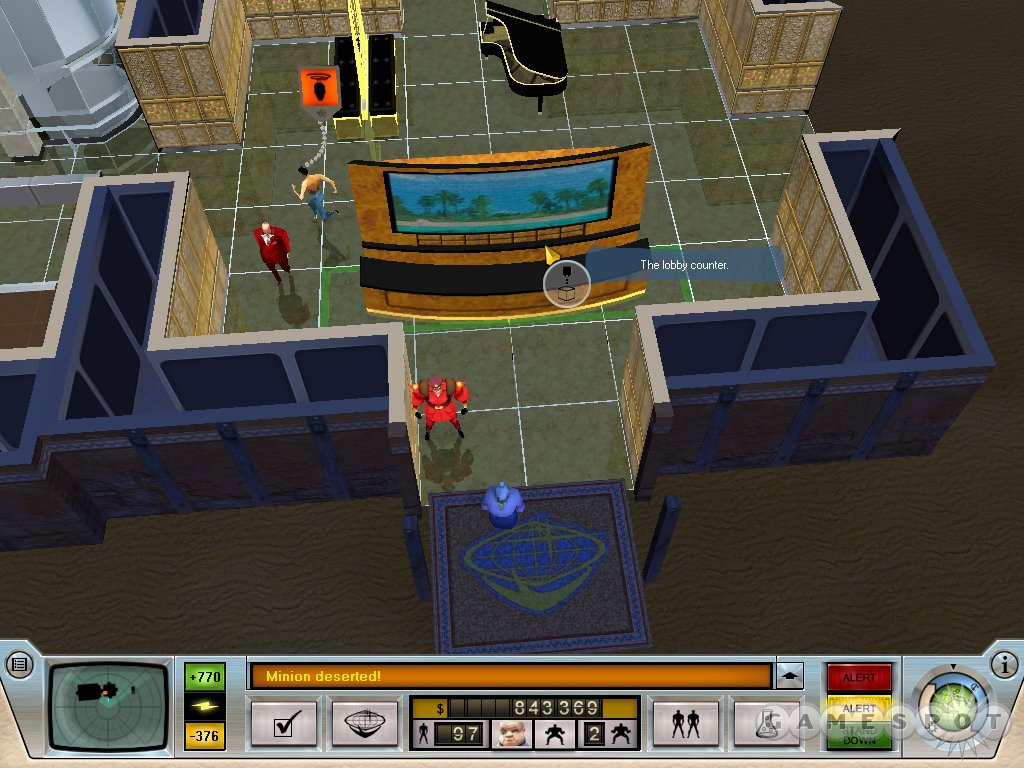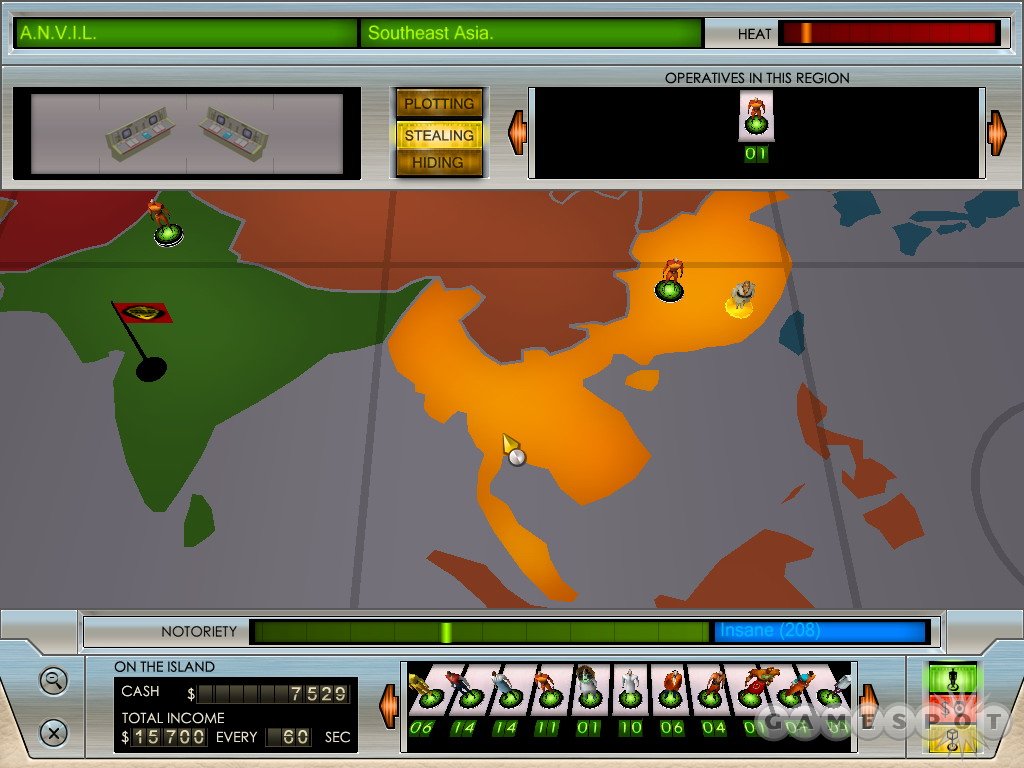Taking its cue from the Austin Powers movies and the No One Lives Forever games, Evil Genius turns '60s superspy camp on its head. No longer must you tolerate sanctimonious one-liners from overpaid agents--it's time to put globe-trotting meddlers in their place in what's essentially a tycoon-style economic strategy game about building an evil empire. Apparently, the life of the aspiring supervillain requires quite a bit more work than gloating over imprisoned do-gooders, as it takes an army of minions to build, maintain, and defend the secret island lair expected of any modern megalomaniacal villain. Indeed, while Evil Genius' dry, campy humor is often amusing from the start, it takes quite a bit of time and effort to pull off acts of infamy and establish your notoriety among global powers. Specifically, Evil Genius is hampered by some frustratingly haphazard pacing as well as issues with the artificial intelligence of your minions. So while you might look the part of a supervillain and get to show off the latest in evil research while you play, unfortunately, it's not always as fun as it sounds.

Before you choose your alter ego, it's best to sit through the tutorial for a refresher course on how to build a top-notch secret lair. Evil Genius' isometric perspective will be familiar if you've played other 3D tycoon games, and the interface isn't difficult to use, but most mechanics are original enough not to feel immediately familiar. Using the extensive information screens can avoid a lot of confusion, and it's also worth paying attention to the tips on the loading screens for helpful keyboard shortcuts. Most of the basics are covered progressively with in-engine videos, and both the tutorial and the videos are laced with the sort of dry jokes you'd expect throughout the game. Unfortunately, this is about the only spoken narrative in Evil Genius.
Picking from the three playable supervillains can quickly seem like one of the game's less consequential decisions, as not only does the bulk of the campaign play out the same, but also running an evil empire rarely requires physically involving the mastermind. The most immediate effect of choosing between Maximilian (the bald Dr. Evil look-alike), Alexis (a fur-wearing beauty), and Shen Yu (a Chinese conspirator with a mystical air) is that each starts with a specific henchman. And while your criminal mastermind may lurk behind the scenes, henchmen play a key role, serving as hero units that gain experience to go toward unlocking two unique abilities. There are around a dozen henchmen total--each echoing the comiclike characters from Bond films, from the well-armed Red Ivan commando to the hypnotic Mesmero to the jive-talking Eli--and you can unlock more as you gain notoriety. As powerful as henchmen are, they aren't invulnerable, and they will be unavailable for a time if they take too much normal damage or if their three lives are used up (henchmen can be killed outright in a fight with one of the five named superagents). Still, since henchmen are the only offensive unit you control directly, it's worth putting their abilities to use.
Since you'll likely have no more than a handful of henchmen, most of your time is spent indirectly running the show, laying plans for the next expansion for your base, adjusting how many minions engage in specialized training, and ordering minions and henchmen to fly off to distant parts of the world to earn money or complete specific missions. Soon enough, the game will impress on you that a criminal mastermind's main talent is not cunning, but patience. Running this operation involves quite a bit of watching and waiting. Approve plans for a new corridor or one of the dozen or so room types, and a blue outline appears. When a minion is free, he'll run to the strong room where your gold and money is stored, pick up a briefcase, run to either the boathouse or helicopter depot, and then return with dynamite to carve the room out of the island volcano you call home. The process is similar for ordering each item, and the round-trip can take less than a minute if there's nothing happening to distract the minion. But if there are too many orders in the queue, pesky enemies on the way to the preferred depot, or too few idle workers, then you're in for a long wait before your build order can be completed.

One of your avatar's uses is to walk over to the tag that is floating over a build order's location and tell minions that it's the highest priority. If this doesn't work to get minions on track, it'll be up to you to diagnose the problem, which can be mundane, as you don't have the facilities to keep minions well rested, fed, healthy, educated, and entertained. Every character that sets foot on your island has five attributes that determine its efficiency. It's not enough to keep minions alive and awake--it's just as much of a problem if their stats for attention, loyalty, or smarts go to zero, since they'll either stand around looking dumb or desert their post. Here's where the evil mastermind's one other ability comes into play. By walking up to a minion and executing him, all shirkers in the area suddenly pay attention and get to work. Things get a lot more complicated than just terrifying minions into obedience, though.
It won't take you long to run out of variations for the sparse selection of rooms and items you start off with, but after completing your initial base, the world map opens up and presents you with plenty of opportunities for criminal acts and involuntary recruiting. The basic construction worker can only do so much, but by capturing military, science, and social specialists, you can steal the secrets of their trade and start training your own specialists. Only the simplest away missions can be accomplished with basic workers, so soon enough you'll need to send specific combinations of specialists for missions that range from stealing special items and rare resources to planting political operatives and getting intelligence needed for your very own doomsday device. It's not long before you can put your scientists to work researching new items and traps. Here again, much of the research process involves waiting for your little people to quietly go about their tasks, as the minions first walk around your base looking for existing items to use as inspiration. Since you never know just what will unlock a whole series of new items (and since research tends to work in spurts and droughts), there's some motivation to build at least one of everything. That is, if you can afford it.

Carving a base out of solid rock and building rooms with shiny steel walls can't be cheap, and your only source of cash is sending workers or, better yet, soldiers out to specific regions in the world to embezzle it. This isn't without consequence, since all evil activities in the world create "heat" with one of the five world powers, and with enough heat, those powers send investigators to your island. If these investigators see anything of note (or are never heard from again), military agents will start showing up to steal your ill-gotten loot, kill your minions, or blow up parts of your base. You might be able to hold off the early waves by sending your guards and henchmen out, especially if you're lucky enough to not have them walk out as the enemies open up fire from far away. But since minions are never overabundant (the upper limit is 100), the primary means of defending the base is to set up traps and sentry guns. Traps can be tricky to set up, starting with the fact that detectors don't always notice smarter agents trained to slip past, and they work best in combination with entry corridors long enough to do away with enemies before they get to critical rooms. Extra incentive to create traps comes into play when successful combinations instantly award a cash bonus. But the smarter agents can smell a trap, and they will attack any offensive item. Without well-timed backup from guards, those expensive traps can quickly go up in smoke.
There's no denying that an aspiring evil genius gets a payoff for all this effort. Unlocking items and traps through research is pretty satisfying, but watching the items in action is a big step up from reading the descriptions. Most room items get your minions involved, and when you zoom right down to it, the animation is quite fluid and usually pretty amusing. Some of the most active items are in the training areas, including dummies that have workers punch and kick their way into shape, a dojo for martial artists, and a bunch of handshaking robots to train ingratiating diplomats. Some items play it straight, while others are there almost purely as a gag, such as the smarts-enhancing sci-fi machine that literally washes brains. While most objectives don't get their own cutscenes, there are plenty that end with a comical interrogation sequence ingeniously involving some ordinary device.
However, objectives can seem few and far between. The first half of the game is made up of only a half-dozen large objectives, and while some leave the order of completion up to you and are composed of smaller tasks that can be tackled in less than an hour, missions get fewer and farther between as you delve deeper into the game. There's a yo-yo effect between success and the heat that it generates, which means that too much activity out in the world will inevitably entrain serious reprisals. The game's toughest moments come when the keys to objectives are hidden in clues written into briefings, which involve multiple world missions that force you to split your limited forces between world deployments and defending the base at home. Between the attrition that away teams always sustain, and the attacks they bring, it's possible to get stuck in a losing proposition when success seems just inches away.
Visual style and the quality of the animation really help the game through its more routine moments. Zooming in on minions going about their business, inspecting the unusual items you've stolen, and watching trap sequences unleash their deadly abilities are the best things to do when you're waiting for minions to carry out your orders. The world has a lot of moving detail upon close inspection, but characters aren't drawn with pinpoint detail, and it works within the cartoonish style. The engine's dynamic lighting and reflections on shiny surfaces can become only too apparent when your power needs to exceed what your generators can handle, and the interiors switch to red emergency lights and then to a shadowy darkness when that's drained. The day-night cycle in the exterior is also something to deal with, since enemies have a much easier time sneaking past your mouse pointer in the dark. This can be a problem, since you have to manually order your minions and sentry guns to deal with them (minions only shoot on sight when the base is on high alert). To vary the exterior visuals somewhat, the chance to switch locations is presented to you after you've spent the first chapters on a desert island.

The introductory sequence and the handful of movies that play behind the menus help to immediately set the game's tone, which is playful but never over the top (it's more in line with James Bond than Austin Powers). If the looping videos aren't enough reason to linger on the menus, then the soundtrack is. While the ambient in-game music is more calming than memorable, the tracks that accompany the game's lengthy load screens and menus recall the more action-packed movie soundtracks of 1960s thrillers.
Evil Genius is surprisingly successful for being so focused on style over substance, but ultimately, the indirect method of controlling what goes on in your lair is more a source of frustration than a solution for avoiding micromanagement. This is particularly apparent when the minion artificial intelligence does brain-dead things, like sending highly trained, unarmed scientists and diplomats out of the base's protection to pick up bodies that are accumulating outside in a war zone. There are relatively few tools for controlling minions' occasional urges for self-destruction--it can come down to thinking ahead enough to lock the doors before they leave. Also stealing some of the satisfaction of having the world at your fingertips is the campaign's irregular pacing and the lack of a fast-forward key. Fortunately, when you do accomplish the more notorious acts of infamy, it's enough to make evil aspirations worthwhile.
Editor's note 09/28/04: The review originally stated that Evil Genius lacked a manual save feature, and only saved the player's progress automatically, which is incorrect. GameSpot regrets the error.



